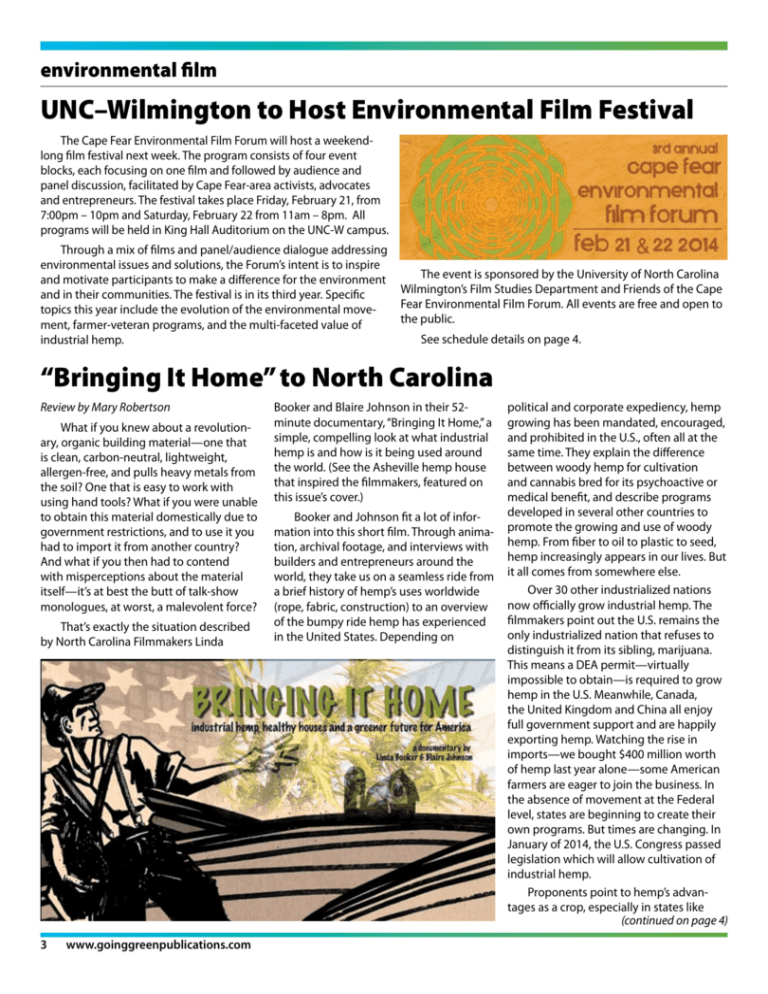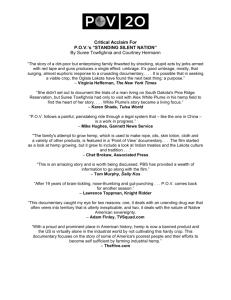UNC–Wilmington to Host Environmental Film Festival “Bringing It
advertisement

environmental film UNC–Wilmington to Host Environmental Film Festival The Cape Fear Environmental Film Forum will host a weekendlong film festival next week. The program consists of four event blocks, each focusing on one film and followed by audience and panel discussion, facilitated by Cape Fear-area activists, advocates and entrepreneurs. The festival takes place Friday, February 21, from 7:00pm – 10pm and Saturday, February 22 from 11am – 8pm. All programs will be held in King Hall Auditorium on the UNC-W campus. Through a mix of films and panel/audience dialogue addressing environmental issues and solutions, the Forum’s intent is to inspire and motivate participants to make a difference for the environment and in their communities. The festival is in its third year. Specific topics this year include the evolution of the environmental movement, farmer-veteran programs, and the multi-faceted value of industrial hemp. The event is sponsored by the University of North Carolina Wilmington’s Film Studies Department and Friends of the Cape Fear Environmental Film Forum. All events are free and open to the public. See schedule details on page 4. “Bringing It Home” to North Carolina Review by Mary Robertson What if you knew about a revolutionary, organic building material—one that is clean, carbon-neutral, lightweight, allergen-free, and pulls heavy metals from the soil? One that is easy to work with using hand tools? What if you were unable to obtain this material domestically due to government restrictions, and to use it you had to import it from another country? And what if you then had to contend with misperceptions about the material itself—it’s at best the butt of talk-show monologues, at worst, a malevolent force? That’s exactly the situation described by North Carolina Filmmakers Linda www.goinggreenpublications.com Booker and Blaire Johnson in their 52minute documentary, “Bringing It Home,” a simple, compelling look at what industrial hemp is and how is it being used around the world. (See the Asheville hemp house that inspired the filmmakers, featured on this issue’s cover.) Booker and Johnson fit a lot of information into this short film. Through animation, archival footage, and interviews with builders and entrepreneurs around the world, they take us on a seamless ride from a brief history of hemp’s uses worldwide (rope, fabric, construction) to an overview of the bumpy ride hemp has experienced in the United States. Depending on political and corporate expediency, hemp growing has been mandated, encouraged, and prohibited in the U.S., often all at the same time. They explain the difference between woody hemp for cultivation and cannabis bred for its psychoactive or medical benefit, and describe programs developed in several other countries to promote the growing and use of woody hemp. From fiber to oil to plastic to seed, hemp increasingly appears in our lives. But it all comes from somewhere else. Over 30 other industrialized nations now officially grow industrial hemp. The filmmakers point out the U.S. remains the only industrialized nation that refuses to distinguish it from its sibling, marijuana. This means a DEA permit—virtually impossible to obtain—is required to grow hemp in the U.S. Meanwhile, Canada, the United Kingdom and China all enjoy full government support and are happily exporting hemp. Watching the rise in imports—we bought $400 million worth of hemp last year alone—some American farmers are eager to join the business. In the absence of movement at the Federal level, states are beginning to create their own programs. But times are changing. In January of 2014, the U.S. Congress passed legislation which will allow cultivation of industrial hemp. Proponents point to hemp’s advantages as a crop, especially in states like (continued on page 4) environmental film Cape Fear Environmental Film Forum: Schedule Details Friday, February 21, 7pm – A Fierce Green Fire: The Battle for a Living Planet A FIERCE GREEN FIRE: The Battle for a Living Planet is the first big-picture exploration of the environmental movement – grassroots and global activism spanning fifty years from conservation to climate change. Directed and written by Mark Kitchell, the Academy Awardnominated director of Berkeley in the Sixties, and narrated by Robert Redford, Ashley Judd, Van Jones, Isabel Allende and Meryl Streep, the film premiered at the Sundance Film Festival 2012, has won acclaim at festivals around the world, and in 2013 begins theatrical release as well as educational distribution and use by environmental groups and grassroots activists. The film will be followed by a panel discussion with the film’s director, Mark Kitchell, Anthony Snider (Associate Professor: UNCW Environmental Studies) Zachary Keith (Chapter Organizer: Wilmington, NC-North Carolina Sierra Club) Kayne Darrell (Founder: Citizens Against Titan) Andy Myers (Campaign Coordinator: Working Films) Saturday, February 22, 11am – Friends School of Wilmington, Special Event Students at the middle school level at the Friends School of Wilmington will premiere their short environmental documentary. The event also includes other short films made by young people from across the country. An assortment of young panelists from Friends School will speak after the screening. Adult panelists TBD. Saturday, February 22, 2pm – Ground Operations: Battlefields to Farmlands Follow our ensemble of combat men and women who served in Iraq and Afghanistan as they share their stories: why they joined the military, how the war experience changed them, their daunting return to civilian life, how they struggled to find a positive pathway forward and ultimately, how they found organic farming and pasture-raising livestock to be an answer to a dream. Their stories are as inspiring as they are pragmatic, as they explore their next mission--food security for America. Saturday, February 22, 5 p.m. – Bringing it Home: Industrial hemp, healthy houses, and a greener future for America A father’s search to find the most healthful building materials leads him to the completion of the nation’s first hemp house. Hemp fibers mixed with lime is a non-toxic, energy efficient, mildew- fire- and pest-resistant building material. The drawback? Industrial hemp is currently illegal to farm in the U.S.A. Industrial hemp is a non-psychoactive plant, grown in 31 other countries. It is the basis for thousands of sustainable products and offers solutions for global warming, nutrition, poverty and deforestation. Here in the U.S., hemp could be a moneymaking crop for farmers and create jobs. But why can’t we grow it here? BRINGING IT HOME tells the story of hemp: past, present and future and a global industry that includes textiles, building materials, food products, bio-plastics, auto parts, and more. The film will be followed by a panel discussion with the film’s co-director/producer, Blaire Johnson, Valerie Robertson (Publisher and Editor: Cape Fear’s Going Green), Pat Delair (Hippocrates Health Educator and Founder of Conscious Integration), Guy Carpenter (Cape Fear Apparel), John Wojciechowski (Lead Instructor: Sustainability Technologies, Cape Fear Community College), and Amy Sawyer (Founder and Owner: Island Wellness Center) For most current film schedule, updates on additional panelists, and to join the discussion, follow the Forum on Facebook at: https:// www.facebook.com/pages/Cape-Fear-Environmental-Film-Forum/ 308636825820445?fref=ts. For more information and media inquiries contact Andre Silva at (910) 962-2229, capefearenviroforum@gmail.com. The film will be followed by a panel discussion: Panelists TBD “Bringing It Home” – continued North Carolina with high unemployment rates and available arable land. Hemp is easy to grow, requiring little irrigation and no pesticides. Its bulky nature means it must be processed within about 300 miles, making it an ideal platform on which to revive and create local industry. This film is a fun watch: packed with facts, I had to see it twice in order to absorb it all. Its wide-ranging explanations and the peek we get into other countries’ attitudes toward using industrial hemp www.goinggreenpublications.com were thought-provoking. In the U.S.,“new” technology is often driven by the small consumer—I can easily imagine small homes of hempcrete springing up around the country. But seeing the large commercial building projects made of hemp— from corporate headquarters to entire housing developments—go up in the United Kingdom and Spain was stunning. When will we see a major corporation building out of hempcrete here? I don’t know. But meanwhile, watch “Bringing It Home” for a down-to-earth look at one of the world’s oldest, yet newest, crops, and you’ll be ready for the revolution. “Bringing It Home “will air Saturday, February 22 at 5:00 pm, followed by postmovie discussion. See companion article for list of panelists, which will include Bringing It Home’s co-producer Blaire Johnson, as well as Valerie Robertson, publisher of Cape Fear’s Going Green.








